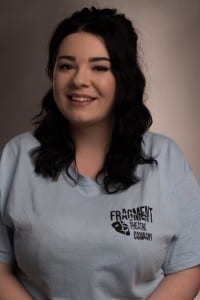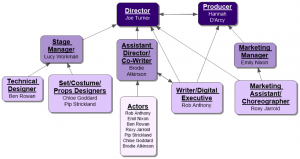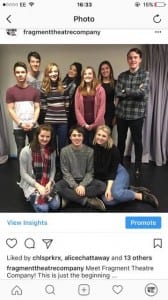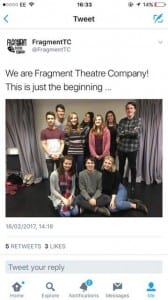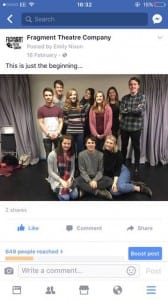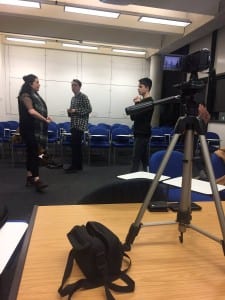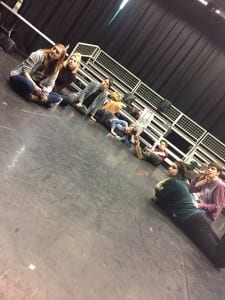The Discussions around the hierarchy within the theatre company started pretty early on, even though we fully plan of working as a collaborative ensemble it’s important for the whole group to understand who has the final say in the circumstance of a disagreement.
So here is a quick rundown of who is in charge of what…
(Rickards, 2017).
Meet Joe, he’s the director here at Fragment theatre company
Joes job as director is too… well Direct. However, Joe is also in charge of
any thing ‘visual’ when it comes to the show. So basically if a member of the group
has an idea.. one which the audience will see, it goes through Joe first. An example being if
our choreography Roxy has some moves she wants the world to see, she will
have to ask Joe first!
(Rickards, 2017).
Meet, well Me (My names Hannah, in case you have forgotten). And I am the producer
of Fragment theatre company. My job is to make sure everything behind the scenes is getting done on time!
for example, posters, set designs and props lists. I also am in charge of all the money! so I get to decide what gets
bought for the show, examples being costumes, set, and Marketing tools. Members of the group will come to me
with any issues they have regarding behind the scenes stuff! For example I know that our set designer Chloe has some pretty
wacky ideas, so I will have to make sure that we have enough money is the budget to cover the costs.
Myself and Joe will be working together to think about things like who gets cast as what part and the kind of staging/
seating we would like in the auditorium.
(Rickards, 2017)
Next up is Lucy, our Stage Manager! Lucy Works very closely along side myself and Joe.
Lucy’s job is to make sure everything is running smoothly, From the rehearsals/productions meetings
to the actual show itself! But are Lucy is super organised so we know she can do it!
Ok, so, The Hierarchy continues but the three main people who make the decisions are myself, Lucy and Joe! We are a group of ten people, which means ten different opinions!
but if any member of the group has a question rather me, Lucy or Joe will be able to answer it. See Below a Diagram of the Hierarchy that our wonderful stage manager Lucy made!
(Workman, 2017)
Citations
Rickards, M. (2017) Fragment Theatre Company. Lincoln: MR Photography.
Workman, L. (2017) Fragment Theatre Company. Lincoln.

